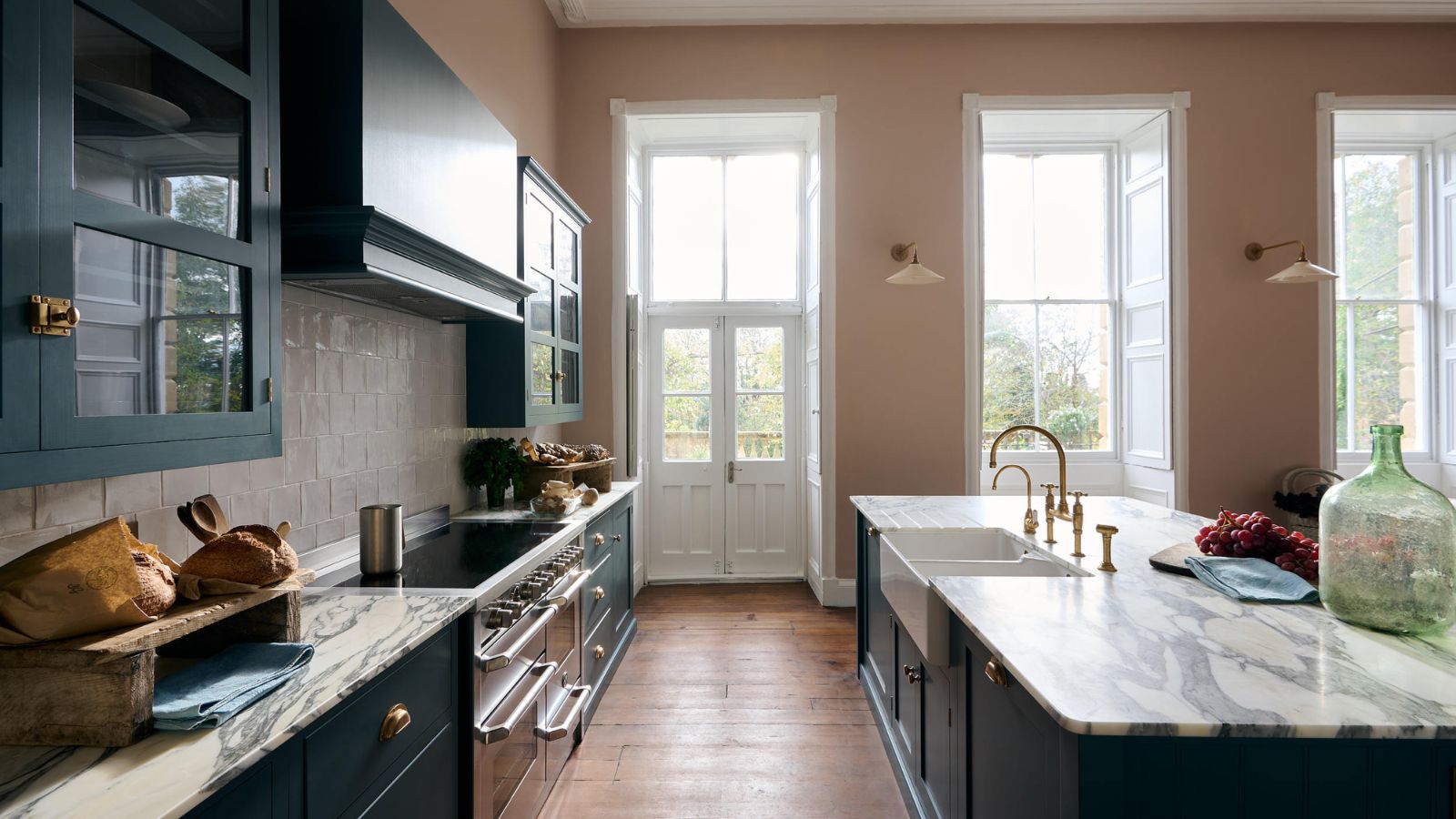Buying your first home? Don't get caught out! Our jargon buster reveals the key terms every first-time buyer should know
Getting familiar with these terms before viewing any properties will save you a headache later

- Adjustable rate mortgage (ARM)
- Appraisal
- Closing costs
- Contingency
- Down payment
- Earnest money
- Escrow
- Equity
- Fixed rate mortgage
- Fixtures
- Personal property
- Pre-approval
- Pre-qualification
- Principal vs interest
- What are the dangers of misunderstanding house buying jargon?
- Does terminology differ depending on where you live?
- Meet the experts

Buying your first house is hugely exciting but it can also feel understandably daunting, particularly if you are unfamiliar with much of the jargon that goes along with the process.
We spoke to top real estate experts to compile this house-buying jargon buster so if you are considering buying a house in spring, you'll be able to move forward with confidence.
Every term a first time buyer should know
'Real estate jargon can feel overwhelming, but if you don’t understand it, you risk making mistakes that could cost you time, money, or even the deal itself,' explains Yoann Dorat from One Sotheby's International Realty, a seasoned professional in the luxury real estate market who has successfully completed over 400 transactions.
Understanding the jargon before you embark on your home-buying journey will help ensure your purchase runs smoothly and without any nasty surprises.
We also spoke to Alexandra Gupta from The Corcoran Group, named in the top one per cent of agents nationwide, to compile these first time buyer tips about the important terms to familiarize yourself with.
Adjustable rate mortgage (ARM)
Whether you are buying a house in fall or at any other time of the year, you need to get to grips with the various mortgage options you'll be faced with.
'An adjustable rate mortgage (ARM) means the interest rate can change, often after an initial fixed period,' explains Alexandra Gupta.
'Misunderstanding how an ARM works could lead to unexpected payment increases down the road,' adds Yoann Dorat.
Your other option will be a fixed rate mortgage.
Appraisal
When buying a house you need to look out for the signs a house isn't worth the investment – this is where an appraisal comes in.
An appraisal is an independent assessment of the home’s value, usually done by a professional appraiser. 'If the appraisal comes in lower than your offer, you may need to renegotiate the price or make up the difference in cash,' explains Alexandra Gupta.
Closing costs
These are fees paid at the end of the transaction, covering things like loan origination, title insurance and escrow fees. 'Buyers often underestimate these costs, which can range from 2–5% of the home’s purchase price,' explains Yoann Dorat. 'Not budgeting for them can create last-minute financial stress.'
'Many buyers focus only on the down payment and forget about the closing costs,' adds Alexandra. 'If you don't budget for them, you may end up scrambling to come up with thousands of dollars at the last minute.'
Contingency
A contingency is a condition in the sale agreement that must be met for the transaction to move forward. If you are thinking of renovating a house, this is an essential term to know.
'Common contingencies include financing, inspections and appraisal conditions,' says Alexandra Gupta. 'Without understanding contingencies, you may unknowingly waive important protections, putting you at risk of buying a property with hidden issues.'
'An inspection contingency allows you to back out if the home has major issues,' adds Yoann. 'If you waive contingencies without understanding the risks, you could be stuck with unexpected repairs.'
Down payment
This is an initial payment made by potential home buyers toward the purchase price of the house.
While real estate trends vary, down payments typically range from 3% to 20%, and are held in escrow until closing.
Earnest money
This is a deposit you put down to show you’re serious about buying the home.
'This money is held in escrow and applied to your down payment or closing costs,' explains Yoann Dorit. 'If you back out of the deal for a reason not covered by your contingencies, you could lose this deposit.'
Escrow
'A neutral third party holds funds such as your down payment until certain conditions are met in the transaction,' says Alexandra. 'If you’re unfamiliar with escrow, you might be confused about why certain funds aren’t available right away, or how your deposit is being protected during the transaction.'
There are certain compromises home buyers should never make so if you are at all confused about this, be sure to ask your real estate agent.
Equity
'This is the portion of the home that you own outright, calculated by subtracting your mortgage balance from the home’s current market value,' explains Alexandra. 'If you don’t understand equity, you may overestimate how much you can borrow or fail to recognize how your investment is growing over time.'
Fixed rate mortgage
'A fixed-rate mortgage means your interest rate stays the same for the entire loan term,' explains Alexandra.
This can be reassuring if you are planning on implementing some renovation ideas in the future as knowing your repayments won't change can help when it comes to budgeting for these.
Be aware that sometimes a fixed rate is only for a small, set number of years and will revert to a variable rate after, meaning your payments could go up or down after this period.
Be careful to check how many years the fixed rate is for, and whether it really is the entire duration of your mortgage, for example 25 years, or just for the next two, three, four or five years. Your financial or mortgage advisor, or your mortgage company can clarify this for you.
Fixtures
'Fixtures are items that are affixed to the property and are included in the sale of the home,' explains Alexandra Gupta. 'Though they are not technically fixtures, most kitchen appliances are included in the purchase.'
Fittings are usually white goods. Fixtures are usually items such as integrated appliances, fitted units for storage in the bathroom, kitchen or other rooms, and hard-to-remove items fixed to the house itself such as carpets or hard floors.
Check with the seller or your realtor about other fixtures such as chandeliers, curtains and rails, or you might buy the house expecting to see these items left behind by the seller, but find they have rightly taken their fittings with them.
Personal property
'These are items that are not affixed to the property that the seller will be keeping,' explains Robert Washington. 'The sellers are also responsible for removing any personal property items prior to closing.'
It could include things such as bed frames, sofas, small appliances, which the seller takes with them to their new home.
If you are currently renting, look into how professional organizers declutter to move to help things feel a little less chaotic when you finally pack up and move into your first owned home.
Pre-approval
This is a term that relates to your mortgage – so add it to your moving house checklist.
'This is when a lender checks your financials and agrees to lend you a certain amount of money, subject to conditions, before you start house-hunting,' adds Alexandra. 'Without pre-approval, sellers may hesitate to negotiate with you because they’re unsure you can secure financing. It’s crucial for making competitive offers.'
Once you have found the property you wish to buy, that pre-approval will revert to a full mortgage application linked to your finances and the property in particular you wish to buy.
Pre-qualification
'Pre-qualification is a basic estimate of how much you can borrow based on self-reported info,' explains Yoann.
It differs from pre-approval as this is just a lender's preliminary assessment of your financial situation. You inform them of factors such as your income, debt and bank balances. This allows them to give you an idea of the price range of homes you may be qualified to buy.
Make sure you also research how much does it cost to hire movers as this can really add to outgoings.
You can also use a free mortgage calculator online to get an idea of how much you can borrow. This can help guide you in your search, or help you decide on what to ask for in your pre-approval.
Principal vs interest
When looking into how much does it cost to move, you need to understand all the terms relating to your future mortgage payments.
'Principal is the amount you borrow, while interest is what you pay the lender for the loan,' says Yoann Dorit. 'Understanding these terms helps you see how much of your payment goes toward paying down your loan versus lender profit. It also helps you evaluate the impact of different loan terms on your budget.'
The higher the interest rate, the more you'll pay over the life of your mortgage.
FAQs
What are the dangers of misunderstanding house buying jargon?
While you might think you can muddle along without fully understanding all the terms thrown at you during the house buying process, it really isn't worth the risk, particularly when buying a historic home, which comes with additional issues to be aware of.
'Misunderstanding terms like interest rates, monthly payments or down payments can put your finances at risk,' warns Alexandra Gupta. 'For instance, you may agree to a loan that’s too expensive for you if you don’t fully understand the interest rate, potentially leading to missed payments or even foreclosure.'
Foreclosure is the legal process by which a mortgage lender or bank will recover the debt (your mortgage loan), which was secured against your property. This means they'll take your home to help repay the debt you can no longer afford. This will tank your credit rating, making it much harder to get another mortgage, or other credit facilities such as an unsecured loan, credit card, store credit or overdraft.
'Home buying comes with a lot of upfront costs (like closing costs) and long-term obligations (like mortgage payments),' continues Alexandra. 'If you're not familiar with these, you could be surprised by costs you didn’t budget for, which can disrupt your home ownership goals.
'Understanding contingencies and other terms lets you make smarter decisions in negotiations,' further adds Alexandra. 'For example, knowing how to include an inspection contingency in your offer can protect you from buying a home with major problems that would be costly to fix. Understanding what equity is allows you to track your investment in your home over time and make informed decisions about when to sell or refinance.'
Does terminology differ depending on where you live?
In short, yes. Different parts of the country use slightly different terminology, so do be aware of this, particularly when buying a fixer upper home.
'The biggest issue that I have as a South Florida real estate broker, is buyers coming from different markets and not understanding the jargon or thinking that the jargon from that previous area translates to the new market they are purchasing in,' points out Jeff Lichtenstein, CEO and broker for 25 years at Echo Fine Properties.
'For example, the "Effective Date" in Florida means time starts on the day when all parties sign off on the deal, continues Jeff. 'In markets like NY, a lawyer writes up the contract. In Florida, we have pre-written and legal contracts. A contact signed off on is hard right away.
'In some markets, the lingo of "as is" might mean the buyer is taking it "as is" literally. In our market, it means that the buyer has a right to inspection but can cancel or renegotiate for any reason at all with no loss of deposit or further penalty.
'NY has "on or about" where closings can be moved,' adds Jeff. 'Our day of closing is the day of closing. Buyer needs to wire the money and the seller has to turn over the keys.'
Meet the experts

With over 15 years of experience in real estate development spanning both France and the United States, Yoann Dorat is a seasoned professional in the luxury real estate market. Having successfully completed over 400 transactions, including high-end flips and developments, Yoann has a deep understanding of the market.

As a Brooklyn native, Alexandra brings a deep intimate understanding of both life in the city and the business of buying and selling therein to all of her deals. In her 10-year real estate career she has invested much time in becoming a go-to Brooklyn residential real estate specialist. Alexandra has been named in the Top 1% of agents nationwide, has been part of Corcoran's multi million dollar club and has consistently been a Brooklyn Top agent of the month year after year.

Robert is founder and broker of Savvy Buyers Realty, a flat fee buyers agency who aim to offer personalized and affordable real estate solutions.

Jeff Lichtenstein, originally from Chicago, got his start in the home furnishings textile business. After the family business was sold, Jeff moved to Florida in 2000 and became a real estate agent. Today he is the owner and broker of Echo Fine Properties, a luxury residential brokerage, based in Palm Beach Gardens, Florida, voted best brokerage of the year. Echo has 100 agents, an average of one million dollars per transaction and over 500 million in annual sales.
Sometimes you might not have all the space you need within your existing property – take a look at our house extension ideas to see whether you really need to move on.
Sign up to the Homes & Gardens newsletter
Design expertise in your inbox – from inspiring decorating ideas and beautiful celebrity homes to practical gardening advice and shopping round-ups.

Natasha has been writing about everything homes and interiors related for over 20 years and, in that time, has covered absolutely everything, from knocking down walls and digging up old floors to the latest kitchen and bathroom trends. As well as carrying out the role of Associate Content Editor for Homebuilding & Renovating for many years, she has completely renovated several old houses of her own on a DIY basis.
You must confirm your public display name before commenting
Please logout and then login again, you will then be prompted to enter your display name.
-
 Step up your pool cleaning routine with Beatbot AquaSense 2 Ultra
Step up your pool cleaning routine with Beatbot AquaSense 2 UltraCelebrate National Pool Opening Day by saving up to $618 on a luxurious pool cleaning solution from Beatbot.
By Sponsored
-
 Isabella Rossellini's kitchen defines 'pantry perfection' – her sleek storage method is one of the most beautiful ways to bring order to your shelves
Isabella Rossellini's kitchen defines 'pantry perfection' – her sleek storage method is one of the most beautiful ways to bring order to your shelvesA custom Chilean applewood pantry lines the walls of the Conclave actress's kitchen – you can tap into her stunning technique from $42
By Megan Slack
-
 5 surprisingly practical ways to re-purpose old bed sheets for cleaning, decluttering and storage at home
5 surprisingly practical ways to re-purpose old bed sheets for cleaning, decluttering and storage at homeDon't ditch worn-out bedding – there's life in them yet
By Natasha Brinsmead
-
 Do you need to turn the lights off when you leave a room? Experts have ended this time-honored debate once and for all
Do you need to turn the lights off when you leave a room? Experts have ended this time-honored debate once and for allOn or off? We delve into the details of this age-old dispute
By Chiana Dickson
-
 I tried the baking soda trick to quickly and naturally clean my outdoor rug – it’s now set for Easter outdoor hosting
I tried the baking soda trick to quickly and naturally clean my outdoor rug – it’s now set for Easter outdoor hostingBaking soda is perfect for lifting dirt and debris
By Eve Smallman
-
 The 5 worst things you can do to your fridge – these will drive up energy costs and result in pricey and regrettable repairs
The 5 worst things you can do to your fridge – these will drive up energy costs and result in pricey and regrettable repairsIt's crucial to swerve these blunders, appliance experts warn
By Ottilie Blackhall
-
 Extend the lifespan of your appliance with 5 simple but crucial washing machine maintenance tips
Extend the lifespan of your appliance with 5 simple but crucial washing machine maintenance tipsFrom cleaning the filters to keeping the door open, experts reveal the washer tips they swear by
By Andy van Terheyden
-
 5 vital ways a home battery backup can help with your most urgent needs in a power outage – from heating to flood prevention and calls
5 vital ways a home battery backup can help with your most urgent needs in a power outage – from heating to flood prevention and callsExperts say they're a worthy investment
By Clement Feng
-
 I’m an HVAC technician, and this is when I turn on my AC each year – plus 5 checks I always do beforehand
I’m an HVAC technician, and this is when I turn on my AC each year – plus 5 checks I always do beforehandSave yourself an AC hassle by running my checks and turning it on before big heat hits
By Josh Mitchell
-
 6 things you should never throw in the trash – and what to do for safe disposal instead
6 things you should never throw in the trash – and what to do for safe disposal insteadFrom batteries to space heaters, experts reveal what not to throw
By Andy van Terheyden